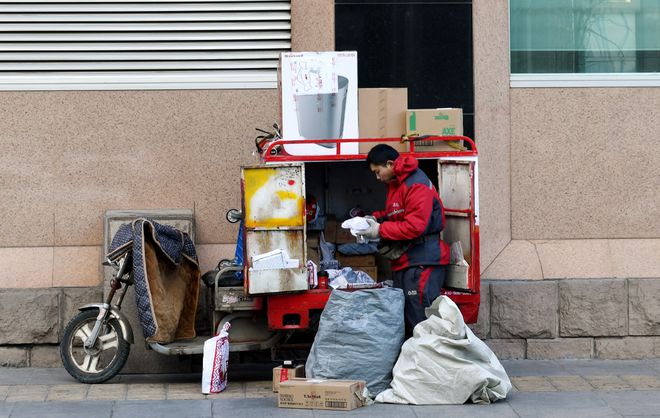JD.com changes its style and changes its own life?
Original by ShenrancaijingAuthor | Tang YahuaEditor | DawnOnce again, a major earthquake occurred in JD.com, causing the second position to change ownership

Original by Shenrancaijing
Author | Tang Yahua
Editor | Dawn
Once again, a major earthquake occurred in JD.com, causing the second position to change ownership.
On May 11th, JD announced that the current CFO of the company, Xu Ran, will replace Xu Lei as CEO and report to Liu Qiangdong.
Since joining JD.com for over a decade, Xu Lei has worked in multiple positions including JD.com, CMO system, JD.com Retail, JD.com Group, and more. Previously, Xu Lei was promoted to the CEO of JD in April 2022. Now, after a year, 49 year old Xu Lei has announced his retirement.
The newly appointed CEO Xu Ran joined JD in July 2018, helping JD complete a series of mergers and acquisitions, restructuring, and IPO actions. But she has no experience in frontline e-commerce business, and before that, she was an audit partner at PwC Zhongtian Certified Public Accountants.
Some people interpret this as Xu Lei completing a phased task and Liu Qiangdong returning to the frontline command. JD's true thoughts are unknown to the outside world, but since the end of last year, Liu Qiangdong has indeed been active frequently and has made a series of adjustments internally.
The most dynamic among them is to propose a "low price strategy" and launch a comprehensive price war. In March 2023, JD launched a "10 billion yuan subsidy". In April, JD announced the opening of its own stores and POP stores (fully known as Platform OpenPlan, referring to third-party sellers on JD). Liu Qiangdong also emphasized that self operated and POP stores "will give certain traffic preferences to whoever can achieve low prices".
The underlying reason, some speculate, is that since 2022, the growth rate of JD's core business has declined, and the performance in exploring sinking markets has not been ideal. Liu Qiangdong is not satisfied with JD's current business. As the overall environment improves, JD may plan to turn its defensive stance into an offensive one, using a low-priced strategy to win back.
In recent years, Liu Qiangdong has repeatedly mentioned that "the quality oriented approach has caused JD to lose user trust in the past few years", repeatedly emphasizing the need to return to the core of retail and regain low prices.
At present, JD's low price strategy has been implemented for some time. However, in the eyes of some merchants, practitioners, and analysts, JD's core users are not price sensitive users themselves, and the fact that low prices can bring traffic may not be true on JD. In that case, merchants have even less motivation to lower prices. If the quality and service of the product are discounted due to price reductions, it also goes against JD's consistent tone.
Is JD changing its life by offering low prices?
Either reduce the price or exit the warehouse, the merchant is confused
In recent months, JD has been undergoing internal adjustments, and businesses have also followed the "earthquake".
Li Bing is a business in the home furnishing industry, and her brand has opened a self operated store and a flagship store on JD.com for over a decade.
For self operated stores, it is necessary to first transport the goods to JD's warehouse and have them shipped by JD. Li Bing said, "Our goods with poor sales performance in the past two months have all been returned from the warehouse. Every month, goods worth over 200000 yuan in the warehouse can be returned for over 100000 yuan, which is very rare in the past.We can either lower the price to increase sales or accept product withdrawal She also found that the review of newly launched products in self operated stores is now more difficult than before, due to the high price. The procurement and sales manager may even directly tell her what the price of similar products is on other e-commerce platforms, causing them to also lower their prices.
Recently, JD launched a 10 billion yuan subsidy, and Li Bing noticed that in order to participate in the 10 billion yuan subsidy, prices need to be reduced. "The system has an automatic pricing system, and as long as the product is listed, it will automatically follow the same price as other e-commerce platforms." Because the price is too low, Li Bing ultimately chose not to participate in the 10 billion yuan subsidy activity.
The series of operations on the platform caused Li Bing to collapse very much. Because of their JD self operated store,The platform's gross margin protection (gross profit protection, which can be understood as a deduction) for their products is 25%, and the brand is at a national unified price. After calculating, the gross profit margin of the self operated store has been reduced to 8% -10% This is still aimed at the tone of the JD platform. Li Bing chose products with high quality and slightly higher profit margins, or customized JD's own products to maintain the normal operation of the store. Now let's benchmark our prices against similar products on other platforms, and we only have to lose money
Not only self operated stores, Li Bing's POP stores have also been affected by JD's latest adjustments. According to the new regulations, merchants do not need to pay an annual service fee of 12000 yuan, but instead charge a transaction handling fee of 0.6%. This measure is friendly for small businesses with low sales, but Li Bing's store's annual sales are far above 2 million. If charged at 0.6%, the expenses will far exceed the previous 12000,She roughly estimated that the service fee would be at least three times higher than before.

From one mile to another, platform adjustments have little benefit for businesses like Li Bing. I don't think the low-priced strategy is in line with JD's tone. We cultivate mid to high-end customers on JD, and our products win with quality and service. Now that the platform suddenly leaves our other conditions unchanged and prices are compared to the lowest prices on other platforms, we will definitely lose a lot
Li Bing revealed that heRecently in a wait-and-see stateShe has not applied for further listing of products that have been returned from the self operated store and have not passed the review. She plans to take a look at JD's next steps.
Some small and medium-sized POP merchants are also not interested in JD's approach. Zhong Qing is a food merchant who has opened a POP store on JD. The brand size is not large, and he did not apply for a self operated store. The reason is that the category he operates has certain requirements for shelf life, and self operation requires sacrificing significant profit margins. Goods also need to be stored in JD warehouses. The cost of stocking multiple warehouses is high, and if they cannot be sold, they must return the goods themselves and find a way to clear the warehouse. If they expire, they must also spend money to destroy them.
And even if JD's self operation can provide a certain amount of sales, it may not be controlled by merchants to achieve the desired effect. Zhong Qing recalled a colleague's sharing, which was a well-known beverage brand that launched a new product priced at 5 yuan. However, it was used as an event on JD's self operated platform, and users placed an order for an additional 1 yuan to get this beverage. The brand's high expectations for the new product positioning were lowered, and it was also difficult to promote it in other channels. The brand questioned the sales personnel, and the other party said, "I sold it to you. This makes the brand feel that,Merchants do not have the initiative.
Zhong Qing did not participate in this ten billion yuan subsidy. I am a businessman, and the platform wants to compete with its peers, afraid of user loss. I don't want to pay for the platform's concerns. It is difficult for us merchants to make significant decisions based on the changes proposed by the platform. The platform's strategy may continue to change,I don't want to be the price the platform tries before I see the results
Zhong Qing believes that most merchants on some e-commerce platforms sell directly from factories. On the one hand, they clear inventory, and on the other hand, factories may not make money, but at least they can maintain operations. Moreover, many products are white label products, mainly driven by price, and users tend to view them as cheap. However, most of the products sold by JD.com are branded products. "If you sell a low price on JD.com, the market will break. What do physical distributors think, how do other e-commerce platforms sell, and how can big anchor collaborations be promoted
In short, some merchants may not have enough room to lower prices or worry that even if they lower prices, they will not bring in traffic, and instead have a bad market, without much motivation to implement JD's low-priced strategy.
What is JD's plan for implementing a low price strategy?
JD has done a lot to promote low prices.
Firstly, it is to release a friendly signal to POP merchants, placing self operated and POP merchants on the same starting line, treating them equally from organizational structure to traffic tilt. Merge the two into one department,Merchants can reduce long end docking and may also reduce internal friction in terms of price.
At the same time, JD has also upgraded merchant specifications.
On April 7th, JD announced that third-party merchants from JD must ship their products within 48 hours after consumers place an order, and must display the shipment and expected delivery time of the product order to consumers; JD's self operated products must be shipped within 24 hours after consumers place an order. In order to achieve "low prices", JD has also relaxed logistics restrictions on merchants and has successively cooperated with Jitu and Yuantong.
In addition, in order to attract more third-party merchant resources, JD has launched the Spring Dawn Plan since the beginning of the year, reducing the threshold for opening a store to natural persons, 90 days of "0 yuan trial operation", and successfully opening a store within 10 minutes at the earliest. JD also provides 12 support policies such as a "new store gift package" of 2100 yuan. Combined with the adjustment of service fees mentioned earlier, it is more friendly to new merchants.
E-commerce practitioner Li Zhijun mentioned that the number of merchants on JD.com is not as high as that on Taobao and Pinduoduo. In recent years, in order to increase merchants, JD.com has launched a large-scale investment campaign for millions of merchants, introduced a large number of industrial belts, lowered the entry threshold for factories and stores, and lifted restrictions on personal stores; The second one is to establish a ToB mall, which accepts collective purchase orders from enterprises, such as JD Huicai business.
Industry research data shows that among the thousands of SKUs subsidized by JD with billions of yuan, POP merchants account for 65%.
Many people are curious, why did JD, which has always focused on quality, suddenly engage in a price war?
There are reasons for JD's performance. In 2022, JD's revenue exceeded the trillion yuan mark for the first time, with a revenue growth rate of only 9.95%. In 2020 and 2021, JD's revenue growth rates were 29.28% and 27.59%, respectively. Looking at GMV again, in 2022, JD's GMV reached 3.47 trillion yuan, with a growth rate of 5.6%, while in 2021, the growth rate was as high as 26.2%.
The latest financial report shows that JD's Q1 revenue in 2023 was 243 billion yuan, a year-on-year increase of 1.4%. There is also a significant gap compared to the 17.95% growth rate in the same period last year. The beginning of 2023 continues the slowdown in growth rate last year.
In the past year, although JD.com has focused on stability and ensured a certain net profit, both revenue and GMV growth rate have revealed that JD.com's development is slowing down. This round of low price strategy and the friendly signal released to third-party merchants can be considered as a way to attract merchants and offer benefits to users.

In addition, over the past few years, JD's self operated procurement and sales have had a strong voice. They have utilized advantages such as traffic traps and marketing tools to obtain more suppliers' supply and tilt the market budget,Causing pressure on third-party merchantsThis hinders the construction of an open platform ecosystem. The prices of JD's self operated products have always been relatively low, and the abundance of merchants is not enough, making it difficult to lower the prices of non self operated products.
Another major reason is that,The e-commerce industry as a whole is oversupplied and extremely inward bound. However, in recent years, C-end consumption has been weak, and the traffic of various e-commerce platforms has declined to varying degrees Naming Yuan, co-founder of Dolphin Think Tank, mentioned that according to his understanding, most e-commerce platforms experienced a rebound in traffic in January and February compared to last year, but it began to decline in March, with the entire traffic declining by over 30%. Platforms are all trying to find ways.
In addition, many people's consumption has been downgraded in recent years,In good times, users are willing to pay a premium for some added value, such as fast delivery, authentic products, and good service. In bad times, facing reality and saving money is the king's way.
According to Ming Yuan's analysis, it is true that JD has always focused on products, services, and efficiency. However, the prices of products on the platform have gradually become more expensive. After all, after the company has started operating, they all want to increase the customer price to make money for themselves and the merchants on the platform. But a new variable has emerged, with Pinduoduo rising, winning the sinking market with low prices, and using billions of subsidies as a brand, attracting many mid to high-end users. Nowadays, with fierce industry competition and user loss, JD can only return to its low-priced strategy.
Obviously,To achieve low prices, it is necessary to increase supply and expand the number of merchants. Under competition, prices will automatically come down.In order to expand businesses, it is necessary to release positive news for businesses, such as lowering the registration threshold, treating self operated and POP businesses equally, dispelling the concerns of POP businesses and new businesses, and making an equal stance.
JD wants to change its own life?
In theory, JD implements a low-cost strategy to retain users, allowing them to enjoy high-quality products and services while also enjoying low prices. This logic is not a problem. But the problem is that many merchants who open self operated stores complain that there is almost no room for price reduction, and they are unwilling to use low prices to lower their established brands. Even if small and medium-sized POP merchants lower prices, they are still far less competitive than self operated stores on the JD platform.
Practitioner Zhang Qi stated that driven by interests, JD.com definitely prioritizes selling products from self operated stores. However, due to platform ecology and corporate responsibility, it may take care of POP merchants. However, JD.com's consistent logic is that if merchants do well, they will become self operated, which is equivalent to judging the next competition.Self operated and POP stores are competitive relationships. Even if the platform treats them equally, users will still prefer self operated stores, and their status will never be equal.
In his view, putting the two types of stores together is equivalent to letting children with poor grades go to the "top class", and the competitiveness of poor students is even weaker. If JD reduces the deduction points and logistics costs for POP merchants, and provides more marketing support, it may have some effects
Wang Wei, who has been doing business as a business representative for merchants for a long time, mentioned, "Previously, we had customers who were willing to do JD's store group, open 10, 20, or even 50 JD POP stores, and could obtain a certain amount of natural traffic. However, now there is too little natural traffic on the platform, unless our brand is strong and users will actively search,If there is no brand and no money spent on promotion, it is difficult to be seen by people The threshold for self operated store review is high, and if you want to become a self operated store, you must first do POP, which is difficult to do well. This has become a paradox
Na Mingyuan said, "I don't think JD needs to follow the trend and provide billions of subsidies. Pinduoduo provides billions of subsidies to become a brand, but JD's brand is already there. However, some of JD's products are obviously on the high side now. In fact, JD's self operated procurement should be cheaper, and it's easy to make a low price
In addition, JD has always had a brand mentality rather than a low-priced mentality. Na Mingyuan added that many businesses now regard JD and Tmall as brand positions, use higher prices as endorsements, and ship goods through Tiktok and community channels.
Zhong Qing also believes that JD.com was first chosen because its products were guaranteed, logistics were fast, and even slightly higher prices were acceptable. Now, doing so may have awakened those who were willing to pay a premium. Previously, they were not sensitive to prices, but now emphasizing billions of subsidies has made them feel like they are the "big loser". JD.com's push for lower prices is a bit of an attack on people's strengths based on their own shortcomings.

JD's low-priced strategy, I think, is a short-term behavior, and the promotional significance outweighs the practical significance. In fact, it is to attract merchants and increase supply Nowadays, e-commerce platforms are all focusing on low prices. If everyone does one action, there won't be much difference. However, all e-commerce platforms are working hard, and if they don't work hard, they will fall behind. Doing it better than not doing it well Naming Yuan said, "Moreover, the subsidy of tens of billions of yuan may not be sustainable for a period of time, because in the end, if both merchants and platforms want to make money, the price must be raised.
Naming Yuan believes that according to JD's style, the strategies formulated by Liu Qiangdong can basically be executed, but the final effect is not yet clear. Ultimately, it depends on how JD blocks its profit line. JD may adjust from profitability to meager profits,After all, the industry is in a competitive situation now, with users and categories reaching their peak. They can only hold onto their own bowl and compete for the share of others' pots at the same time
Anyway, JD's core users are still there. When users purchase large products such as 3C products, home appliances, or high priced products, their first choice is still JD, which ensures the basic foundation of JD's business. For some fast moving consumer products that do not have strong requirements for quality and timeliness, users may purchase them separately on various platforms.
From the recent frequent strategic adjustments and personnel changes, it can be seen that JD has a great determination to promote change. As for whether JD can leverage merchants and attract users through its low-priced strategy in the future, it is still unknown.At present, practitioners are puzzled that the quality image created by JD.com itself needs to be disrupted at a low price, which is equivalent to JD.com changing its own life After all, coexisting high-quality, high-quality service, and low prices is a challenge in itself.
*The captions and illustrations in the text originate from Visual China. At the request of the interviewee, Li Bing, Zhong Qing, Zhang Wei, Zhang Qi, and Li Zhijun were pseudonyms in the text.
Tag: changes its JD.com style and own life
Disclaimer: The content of this article is sourced from the internet. The copyright of the text, images, and other materials belongs to the original author. The platform reprints the materials for the purpose of conveying more information. The content of the article is for reference and learning only, and should not be used for commercial purposes. If it infringes on your legitimate rights and interests, please contact us promptly and we will handle it as soon as possible! We respect copyright and are committed to protecting it. Thank you for sharing.


